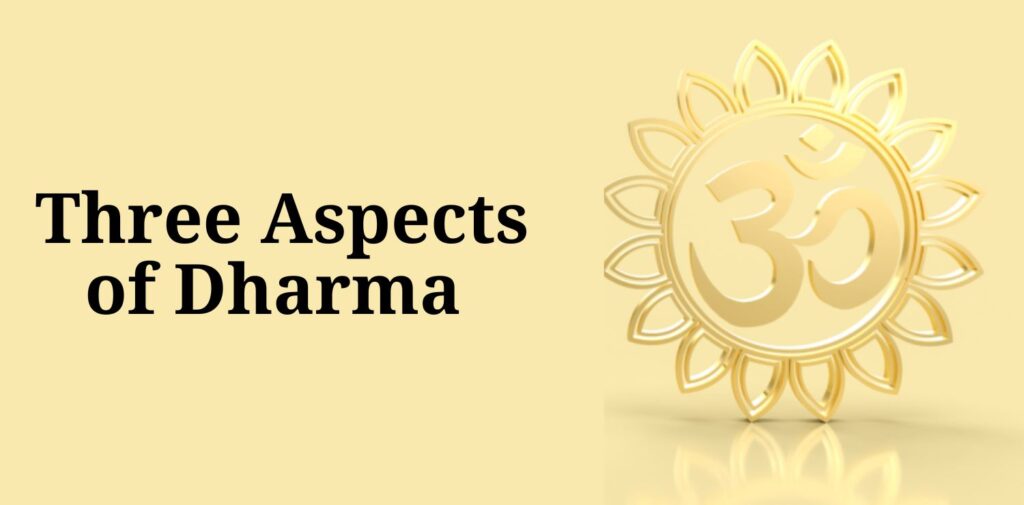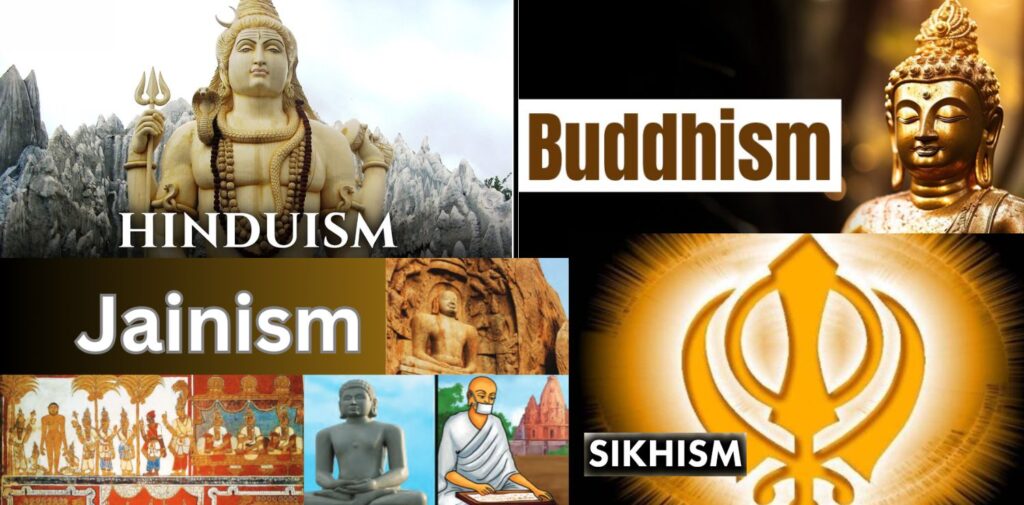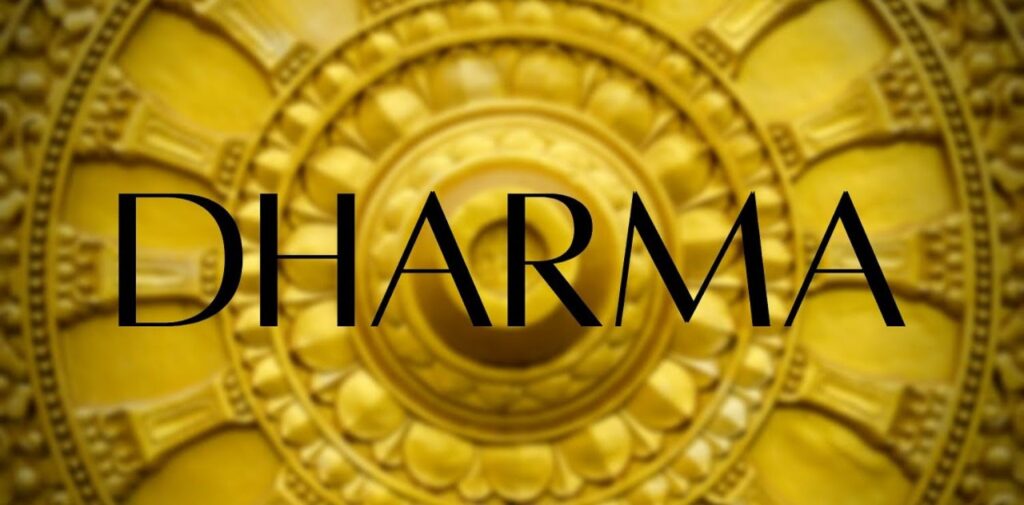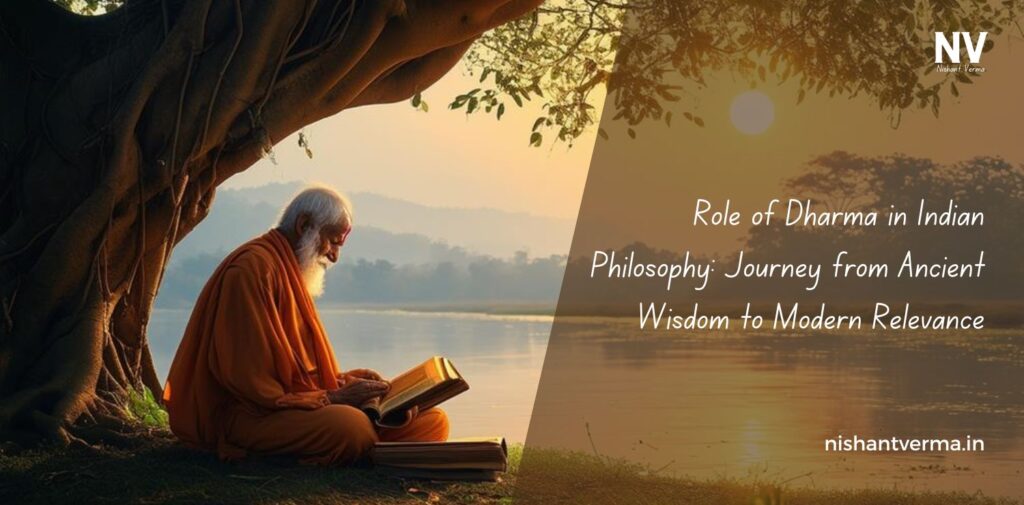Dharma is one of the most important and complex concepts in Indian philosophy. It is a term that can mean different things depending on the context in which it is used. In its simplest form, Dharma refers to the moral and ethical principles that govern individual and collective behavior. But its meaning goes much deeper, touching on the spiritual, social, and even cosmic order. To understand Dharma fully, we must explore its historical roots, its evolution over time, and its continuing relevance in today’s world.
Dharma in Ancient Indian Texts
The concept of Dharma finds its roots in some of the oldest texts in human history, including the Vedas, the Upanishads, and the epics like the Mahabharata and Ramayana. In these texts, Dharma is not just about following a set of rules or laws; it is about living in harmony with the universe, fulfilling one’s duties, and realizing one’s true nature.
- In the Vedas, Dharma is seen as the law that governs both the universe and human life. It is the cosmic principle that upholds order and balance in nature and society. The term is often linked to righteousness, truth, and justice, and it is believed that following Dharma ensures the proper functioning of the world.
- In the Upanishads, which are philosophical texts that explore the nature of reality and the self, Dharma becomes more individualistic. It emphasizes the idea of living in accordance with one’s true self and aligning one’s actions with the divine order of the universe (Brahman).
- The Mahabharata, one of the most famous epics of Indian literature, provides one of the most detailed discussions on Dharma. The Bhagavad Gita, a part of the Mahabharata, offers profound teachings about Dharma through a conversation between Prince Arjuna and Lord Krishna. Arjuna is faced with a moral dilemma about fighting in a war that pits family members against each other. Krishna guides him to perform his duty (Dharma) without attachment to the outcome, stressing the importance of selfless action.

The Three Aspects of Dharma
In Indian philosophy, Dharma can be seen from three different perspectives:
- Dharma as Cosmic Order: The idea that Dharma is the natural law that governs the entire universe. Everything in nature—from the movement of stars to the growth of plants—follows Dharma.
- Dharma as Social Duty: Dharma also refers to the duties and responsibilities each person has toward society. This includes behaving ethically, treating others with respect, and fulfilling roles within the family, community, and nation.
- Dharma as Personal Ethics: On a more personal level, Dharma is about individual righteousness, the pursuit of truth, and inner peace. It is about doing what is right, even when no one is watching, and cultivating virtues like honesty, kindness, and compassion.
Dharma in the Context of Karma
The idea of Dharma is closely linked with the concept of Karma (action and its consequences). According to Indian philosophy, every action has consequences, and these consequences are determined by whether the action was in alignment with Dharma. Good actions, done in accordance with Dharma, lead to positive outcomes (good Karma), while actions that go against Dharma result in negative consequences (bad Karma).
This relationship between Dharma and Karma teaches that our actions shape our future, and the only way to create a positive future is by living a life guided by Dharma. By following Dharma, individuals contribute not only to their own spiritual progress but also to the welfare of society and the world at large.

Dharma in Hinduism, Buddhism, Jainism, and Sikhism
While the concept of Dharma is most widely discussed in Hindu philosophy, it is also an essential part of other Indian spiritual traditions like Buddhism, Jainism, and Sikhism.
- In Buddhism, Dharma refers to the teachings of the Buddha, which are meant to guide individuals on the path to enlightenment. The Four Noble Truths and the Eightfold Path in Buddhism provide practical guidelines for living in harmony with Dharma, focusing on ethical conduct, wisdom, and mental discipline.
- In Jainism, Dharma is closely related to non-violence (Ahimsa), truthfulness, and respect for all living beings. Jain philosophy emphasizes that every living being has a soul, and the practice of Dharma involves purifying the soul by following strict ethical principles.
- In Sikhism, Dharma is about living a truthful, honest life in service to others. Sikhs believe that by serving humanity, living a life of humility, and remembering God, one can align with the divine order (Dharma) and ultimately achieve liberation.
Dharma in Modern Indian Thought
As India has evolved into a modern and diverse society, the concept of Dharma has adapted to new challenges. In contemporary Indian philosophy, Dharma is not just about individual duties or spiritual liberation; it also deals with social justice, human rights, and environmental sustainability.
Many modern thinkers and leaders have interpreted Dharma as a call for social and political responsibility.
In the modern context, Dharma also addresses issues of gender equality, caste discrimination, and environmental protection. It calls for the protection of human rights and emphasizes the importance of justice, equality, and compassion in society. The idea of Dharma as social responsibility is increasingly important in India today, especially as the country grapples with rapid modernization, globalization, and environmental challenges.

Dharma and Its Relevance Today
In today’s fast-paced world, where the pace of life is ever-increasing, and material success often takes precedence over moral values, the idea of Dharma remains a powerful tool for guidance. Whether it’s about making ethical decisions at work, maintaining healthy relationships, or striving for a balanced and peaceful life, Dharma offers timeless wisdom.
One of the most relevant aspects of Dharma in contemporary society is its emphasis on personal integrity and selfless service. In a world full of distractions and temptations, following Dharma can help individuals maintain a sense of purpose and direction. It teaches that true happiness comes not from external possessions or achievements but from inner peace and the knowledge that one is living in accordance with moral and spiritual principles.
Furthermore, in a world that is increasingly interconnected, Dharma also calls for global responsibility. The concept of Dharma encourages people to think beyond their individual needs and to contribute to the collective good. Whether it’s in the context of climate change, poverty, or human rights, following Dharma means recognizing that all beings are interconnected and that our actions impact the world in profound ways.
Conclusion: Dharma in Indian Philosophy
Dharma is more than just a religious or philosophical concept; it is a guide to living a life of integrity, responsibility, and balance. Whether it’s about individual duties, social obligations, or universal harmony, Dharma provides a framework for making ethical decisions and leading a life that contributes to the well-being of others.
In the ancient texts, Dharma was seen as the law of the universe, and in modern times, it continues to serve as a moral compass, reminding us of our duties to ourselves, our society, and the world. In a world filled with complexity and uncertainty, the teachings of Dharma offer timeless wisdom that can help navigate life’s challenges and lead to a more peaceful, just, and harmonious existence. By embracing Dharma, we not only enrich our own lives but also contribute to the greater good of humanity.




